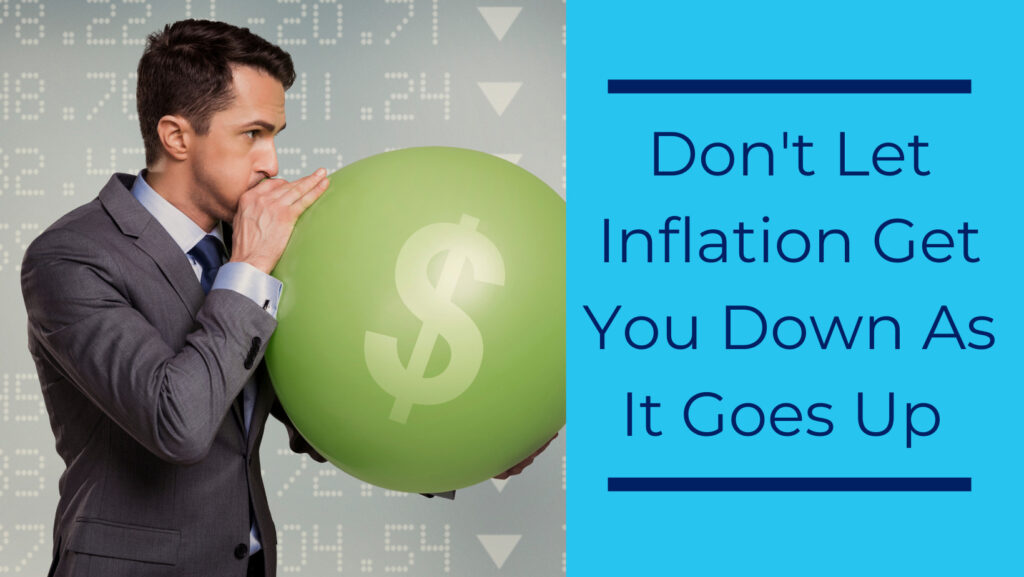What goes up must come down, right? Inflation seems to be an exception. As inflation rates continue to climb, many families are worried about how they will afford the increasing cost of living. Here are a few ways to reduce the impact inflation has on your finances, with links to other great articles for more tips on each idea.
Make more money.
- If your employer has not increased your salary in a while, ask for a raise. Most companies recognize the need to adjust salaries annually to keep up with inflation, and it is not uncommon to see a 1-3% increase in pay each year. If hoping for a bigger jump in compensation, ask your employer for alternate options to consider within the company. Maybe there is another role at a higher pay level that you are ready for, or perhaps you can take on some additional tasks to see a bump in pay (whether a salary increase or a bonus opportunity).
- Consider taking on a second part-time job or explore opportunities to make extra cash from home. Given there is a current housing shortage and low vacancy rates for home rentals, it’s an excellent time to take in a student or convert part of your home into a suite to generate additional income. Selling items you no longer need or use online can also fetch some nice dollars if you are willing to put in some effort to list them and respond to queries.
Cut your expenses.
- We all spend money on things we don’t need to from time to time, but it’s easier said than done to change old habits. The best way to identify what you can cut back on to free up more cash flow is to track every dollar you spend over the next 30 days. The process of tracking where your money goes brings spending top of mind and forces you to ask yourself “do I really need to spend money on this right now?”. I’m not a fan of the word “budget” as it implies cutting back and restricting spending – and who likes being told no? Similar to how dieting is often about what you can’t eat. I prefer to use the term “intentional spending” instead. It’s your money; you can spend it however you want! Being intentional about how you spend will ensure you have the money you need for the things you really want vs wasting your hard-earned money on things that don’t have a positive impact in your life. A few easy tips to free up cash immediately include:
- Make coffee at home vs buying that $6 Americano at the coffee shop,
- Pack your own delicious lunch for a fraction of the cost of eating out,
- Take public transit versus guzzling up gas at these crazy prices (not to mention save on parking fees), Added Perk – people watching is entertaining!
- Cut back on monthly subscriptions you rarely use (and maybe even forgot you were paying for),
- Shop the sales when buying essential items like groceries.
Added tip: Only use your credit card for purchases you can afford and will pay off in full each month. Unpaid credit card balances are subject to high interest rates that erode wealth and negatively affect your monthly cashflow.
These few simple tips can put hundreds of dollars in your bank account every month!
Invest wisely.
- When finances feel tight, it’s easy to reduce how much you are saving – but don’t! Putting money aside now for your future will ensure you live the life you want. Having a healthy investment account reduces stress and creates opportunities for joy. Without savings, how will you go on that family vacation next year?
- Investing your money wisely will help you build wealth. There are many investments that tend to perform very well during inflationary periods. Work with your Financial Advisor to explore those opportunities and watch your money work for you.
- Aim to save 10-20% of your net pay every month to create good money habits that will put you in a strong financial position going forward. More than half of this savings amount should be directed towards retirement funding, with the rest split between building an emergency fund and fun money for trips or toys that bring you joy.
Added tip: Be mindful of rising interest rates as it pertains to your debt. There is a good chance your debt is based on a variable interest rate, which means it will get more expensive as interest rates rise. Even fixed rate mortgages present risk as the rate will likely be higher at your next mortgage renewal date and would then result in higher monthly payments &/or a longer amortization period (meaning it will take longer to pay it off). As your savings rise, you may decide to redirect some of that savings to debt repayment. Keep an eye on the interest rate on your debt to ensure it doesn’t exceed the rate of return on your investments.
The secret to living a Wealthy Life is to spend less than you earn! You will always have more than you need if you live by this philosophy, and remember, this period of volatility shall pass. Focus on what you can control and you should be well positioned to ride through this inflationary cycle with ease.
